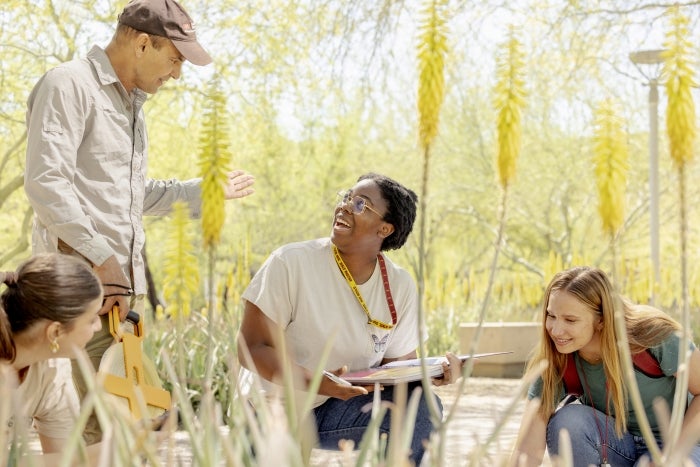ASU Online earth and environmental sciences programs allow students to forge unique academic paths

Students take water samples from Tempe Town Lake as part of ASU Online's earth and environmental sciences programs. Photo courtesy of ASU/EdPlus
This fall, ASU Online is launching two new online programs that will open new horizons for students interested in our natural environment: a Bachelor of Arts and a Bachelor of Science, both in earth and environmental sciences.
These degrees expand the range of online natural science courses offered through the School of Earth and Space Exploration. They provide an alternative avenue for those seeking to deepen their understanding of the Earth's natural processes and systems and their connection to human society. The innovative approach of these programs applies quantitative and analytical skills to develop evidence-based environmental solutions.
What sets these programs apart is their unparalleled flexibility. Individually and in combination, they cater to the diverse needs of students, whether they're located across the globe or balancing professional commitments.
"The study of the earth and environmental sciences is more important than ever in today’s world, and we seek to make these degrees as accessible and inclusive as possible," said Meenakshi Wadhwa, director of the School of Earth and Space Exploration. "This online degree will not only offer many more students the opportunity to learn about the Earth and our environment, it will also help students develop skills in complex problem-solving to address environmental problems using interdisciplinary approaches."
With a strong focus on practical skills and critical thinking in both degrees, students will gain a comprehensive understanding of Earth as a complex system, equipping them with the tools and knowledge to tackle real-world environmental challenges. The Bachelor of Science degree shares the same core curriculum as the Bachelor of Arts degree, but with more emphasis on the graduate’s skills in quantitative data analysis.
"Earth and environmental sciences is at its heart an environmental science degree,” said Hilairy Hartnett, deputy director of the School of Earth and Space Exploration. "We want students to understand how humans interact with their environment."
One of the most exciting aspects of these programs is their interdisciplinary nature. Students are encouraged to chart their own course, exploring the intersections of their interests and crafting a truly unique educational experience. The curriculum of each covers a broad spectrum of crucial subjects, including biogeochemical cycles, ecosystems, natural hazards, drivers of climate change, human–environment relationships and the essential natural resources that underpin human societies.
Designed with accessibility in mind, these programs allow students to study at a pace that fits their lifestyle and commitments.
"Graduates of these programs are very well prepared to make an impact on making this planet a better place for humans," said Arjun Heimsath, professor at the School of Earth and Space Exploration. "And they can make that impact based on their passions."
Students enrolled in either the Bachelor of Arts or Bachelor of Science in earth and environmental sciences programs will have a unique opportunity to acquire scientific knowledge and essential communication and problem-solving skills through cutting-edge data analysis techniques guided by field experts using the latest tools and technology.
“Our faculty have worked to develop a unique program in the environmental sciences, drawing on a foundation in the Earth sciences to more fully appreciate the environment we live in, how it evolves, how it influences us and how we influence it,” said Kelin Whipple, associate director for undergraduate programs in the School of Earth and Space Exploration. “We are excited about the opportunity to bring this perspective to a greater number of motivated individuals through our online programs, using the best technology and educational approaches.”
More Science and technology

ASU and Deca Technologies selected to lead $100M SHIELD USA project to strengthen U.S. semiconductor packaging capabilities
The National Institute of Standards and Technology — part of the U.S. Department of Commerce — announced today that it plans to award as much as $100 million to Arizona State University and Deca…

From food crops to cancer clinics: Lessons in extermination resistance
Just as crop-devouring insects evolve to resist pesticides, cancer cells can increase their lethality by developing resistance to treatment. In fact, most deaths from cancer are caused by the…

ASU professor wins NIH Director’s New Innovator Award for research linking gene function to brain structure
Life experiences alter us in many ways, including how we act and our mental and physical health. What we go through can even change how our genes work, how the instructions coded into our DNA are…
